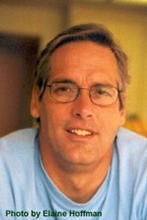Paul Hoffman (1952-2010)
Professor of Philosophy, Emeritus
Education
Ph.D., University of California, Los Angeles
Areas of Interest
Early Modern Philosophy; Descartes.
Early Modern Philosophy
Paul Hoffman was a member of our Department from 1992 until May of 2010, when he died suddenly and unexpectedly after an early morning swimming work-out. Paul was a terrific philosopher, a supportive and inspirational teacher, and a wonderful colleague. We are very fortunate to have had him as a member of our Department.
Paul spent his freshman year at Brown and then transferred to Michigan where he began his study of philosophy and received his BA. He earned his PhD in philosophy at UCLA, where he studied under Robert Adams. He was an assistant professor at Harvard University from 1982-85, a Mellon Postdoctoral Fellow at Cornell University from 1985-87, and an assistant professor at MIT from 1987-1992. He joined the UCR faculty in 1992.
Paul was a world-class Descartes scholar. Although he wrote on a broad range of philosophers and topics – including Plato, Aquinas, Spinoza, Leibniz, Locke and Reid – he is best known for his ground-breaking work on Descartes. Paul focused on the metaphysical, as opposed to the epistemological, side of Descartes’s philosophy, and believed that in order to understand Descartes one needs to understand the Aristotelian-scholastic background to his thought. Paul was one of the first scholars trained in the analytic tradition to appreciate the importance of understanding the historical background to Descartes, and rather than focusing on Descartes’s revolutionary departures from his predecessors, he tended to emphasize the neglected continuities. His main work on Descartes is found in his collection, Essays on Descartes, which he published in 2009. Although Paul was known primarily as a historian of philosophy, he was also a constructive philosopher in his own right who made contributions to contemporary work in the philosophy of the mind, causation, free will, and metaphysics.
In addition to being a very talented scholar and philosopher, Paul was quite an athlete. He was a serious swimmer who was nationally ranked in his age group and an avid surfer.
In order to make Paul’s work as widely accessible as we can, we have re-constituted his website. Below is a list of his publications with links to most of his published papers and a statement of his research aims which he wrote when putting together his collection.
Paul Hoffman’s Publications
- “Reasons, Causes, and Inclinations,” in Emotion and Cognitive Life in Medieval and Early Modern Philosophy, ed. Lisa Shapiro and Martin Pickavé (Oxford: Oxford University Press, 2012).
- “Hume on the Distinction of Reason,” British Journal for the History of Philosophy 19:6 (2011): 1131-1141.
- “Final Causation in Spinoza,” in Final Causes and Teleological Explanations, ed. Dominik Perler and Stephen Schmid (Paderborn: Mentis, 2011), a special issue of Logical Analysis and History of Philosophy 14 (2011): 40-50.
- “Descartes,” in A Companion to the Philosophy of Action, ed. Timothy O’Connor and Constantine Sandis (Oxford: Blackwell, 2010), 481-89.
- “The Passions and Freedom of Will,” in Essays on Descartes, (Oxford: Oxford University Press, 2009), 210-236. Also published in Passion and Virtue in Descartes, ed. André Gombay and Byron Williston (Amherst, NY: Humanity Books, 2003), 261-99.
- “Does Efficient Causation Presuppose Final Causation? Aquinas Vs. Early Modern Mechanism,” in Metaphysics and the Good: Themes from the Philosophy of Robert Merrihew Adams, ed. Larry Jorgensen and Samuel Newlands (Oxford: Oxford University Press, 2008) 295-312.
- Essays on Descartes, (Oxford: Oxford University Press, 2009).
- “Freedom and Weakness of Will,” Ratio XXI (2008): 42-54.
- Contemporary Perspectives on Early Modern Philosophy: Essays in Honor of Vere Chappell, co-edited with David Owen and Gideon Yaffe (Buffalo: Broadview Press, 2008).
- “The Union and Interaction of Mind and Body,” in A Companion to Descartes, ed. Janet Broughton and John Carriero (Oxford: Blackwell, 2007), 390-403. Also published in Essays on Descartes, (Oxford: Oxford University Press, 2009), 77-87 (Part 1), 101-104 (Part 2).
- “Descartes Watch Analogy,” British Journal for the History of Philosophy 15:3 (2007): 561-567.
- “Thomas Reid’s Notion of Exertion,” Journal of the History of Philosophy Volume 44, Number 3 (2006): 431-447.
- “Locke on the Locked Room,” Locke Studies Volume 5 (2005): 58-74. Abstract.
- “Aquinas on Threats and Temptations,” Pacific Philosophical Quarterly 86 (2005): 225-242.
- “Aquinas on Spiritual Change,” Medieval Philosophy and Theology (accepted November 2004), forthcoming.
- “Plato on Appetitive Desires in the Republic,” Apeiron 36 (2003): 171-174.
- “Direct Realism, Intentionality, and the Objective Being of Ideas,” Pacific Philosophical Quarterly 83 (2002): 163-179.
- “Descartes’ Theory of Distinction,” Philosophy and Phenomenological Research 44 (2002): 57-78.
- “Cartesion Composites,” Journal of the History of Philosophy 37 (1999): 251-270.
- “The Being of Leibnizian Phenomena,” Studia Leibnitiana 28 (1996): 108-118.
- “Descartes on Misrepresentation,” Journal of the History of Philosophy (1996): 357-381.
- “Responses to Chappell and Watson,” Philosophical Studies 77 (1995): 283-292.
- “Freedom and Strength of Will: Descartes and Albritton,” Philosophical Studies 77 (1995): 241-260.
- “Alternative Possibilities: A Reply to Lamb,” (with John Fischer), Journal of Philosophy 91 (1994): 321-326.
- “Three Dualist Theories of the Passions,” Philosophical Topics 19 (1991): 53-200. Also published in Essays on Descartes, (Oxford: Oxford University Press, 2009), 210-236. Abstract.
- “Cartesian Passions and Cartesian Dualism,” Pacific Philosophical Quarterly 71 (1990): 310-333. Also published in Essays on Descartes, (Oxford: Oxford University Press, 2009), 210-236.
- “St. Thomas Aquinas on the Halfway State of Sensible Being,” The Philosophical Review 99 (1990): 73-92.
- “The Unity of Descartes’s Man,”The Philosophical Review 95 (1986): 339-370.
- “Kripke on Private Language,” Philosophical Studies 47 (1985): 23-28.
Note: This bibliography draws heavily on John Carriero’s introduction to the Midwest Studies in Philosophy special issue: Early Modern Philosophy Reconsidered Vol. 35 (2011), 103.

